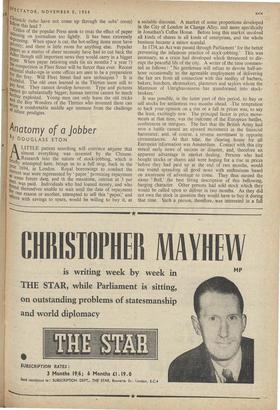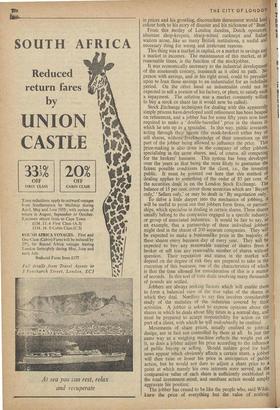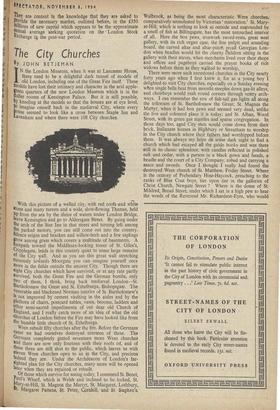Anatomy or a Jobber DOUGLASS ETON LITTLE patient searching will
convince anyone that almost everything was invented by the Chinese. b, & Research into the nature of stock-jobbing, which is bucflY attempted here, brings us to a full stop, back in the Lear 1694, in London. Royal borrowings to conduct the rrent war were represented by 'paper' promising repayment egt some future date, and in the meantime, interest at 3 per gnt. Was paid. Individuals who had loaned money, and who und themselves unable to wait until the date of repayment LocT one reason or another, attempted to sell this paper,' and tilers with savings to spare, would be willing to buy it, at a suitable discount. A market of some proportions developed in the City of London in Change Alley, and more specifically in Jonathan's Coffee House. Before long this market involved all kinds of shares in all kinds of enterprises, and the whole business became a minor scandal.
In 1734, an Act was passed through Parliament' for the better preventing the infamous practice of stock-jobbing.' This was necessary, as a craze had developed Which threatened to dis- rupt the peaceful life of the city. A writer of the time commen- ted as follows: No gentleman will refuse to devote half-an- hour occasionally to the agreeable employment of delivering the fair sex from all connection with this medley of barbers, bakers, butchers, shoemakers, plasterers and taylors whom the Mammon of Unrighteousness has transformed into stock- brokers.'
It was possible, in the latter part of this period, to buy or sell stocks for settlement two months ahead. -The temptation' to back your opinion on a rise or a fall in prices was, to say the least, excitingly new. The principal factor in price move- ments at that time, was the outcome of the European battles, conferences or intrigues. The fact that the British Army had won a battle caused an upward movement in the financial barometer, and, of course, a reverse movement in opposite circumstances. At that time, the clearing house for all European information was Amsterdam. Contact with this city meant early news ot success or disaster, and, therefore an apparent advantage in market dealing. Persons who had bought stocks or shares and were hoping for a rise in prices before they had paid up at the end of two months, would run round spreading all good news with enthusiasm based on awareness of advantage to come. They , thus earned the name Bull,' the best fitting description of this bellowing, barging character. Other persons had sold stock which they would be called upon to deliver in two months. As they did not own the stock in question they would have to buy it during that time. Such a person, therefore, was interested in a fall in prices and his growling, disconsolate demeanour would lend, colour both to his story of disaster and his nickname of 'Bear. From this motley of London dandies, Dutch operators, absentee shop-keepers, sharp-witted cockneys and Italiaa waiters arose, like so many British institutions, a useful and necessary thing for wrong and irrelevant reasons. This thing was a market in capital, or a market in savings and a market in incomes. The maintenance of this market, at all reasonable times, is the function of the stockjobber. It was economically necessary to the industrial development of the nineteenth century, inasmuch as it oiled its path. No person with savings, and in his right mind, could be prevailed upon to loan those savings to an industrialist for an indefinitz period. On the other hand an industrialik could not be expected to sell a portion of his factory, or plant, to satisfy such a repayment. The solution was 'a market constantly willing to buy a stock or share (as it would now be called). Stock gxchango techniques for dealing with this apparently simple piocess have developed until refinement has been heaped on refinement, and a jobber has for some fifty years now been required to make a ' double-barrelled ' price in the shares Iii which he sets up as a specialist. In this way, public investors, acting through their agents (the stock-brokers) either buy or sell shares, without foreknowledge of their intentions on the part of the jobber being allowed to influence the price. This price-making is also done in the company of other jobbers, specialising in the same shares, and, of course, all competing for the brokers' business. This system has been developed over the years as that being the most likely to guarantee the fairest possible conditions for the client, i.e., the investing public. It must be pointed out here that this method of dealing applies to something of the order of 85 per cent. of the securities dealt in on the London Stock Exchange. The balance of 15 per cent. cover those securities which are 'Buyer only,' 'Sellers only,' or may be dealt in 'By negotiation only: To delve a little deeper into the mechanics of jobbing. It will be useful to point out that. jobbers form firms, or partner- ships, which specialise in dealing in certain shares. These shares usually belong to the companies engaged in a specific industry, or group of associated industries. It would be fair to say, as an example, that a partnership of three individual jobbers might deal in the shares of 200 separate companies. They will be expected to make a businesslike price in the majority of these shares every business day of every year. They will be expected to buy any reasonable number of shares from a broker or sell him any reasonable number of shares without question. Their reputation and status in the market will depend on the degree of risk they are prepared to take in the execution of this business, one of the characteristics of which is that the time allowed for consideration of this is a matter of seconds. In this sort of time deals involving many thousands of pounds are settled. Jobbers are always seeking factors which will enable them to form a balanced view of the true value of the shares ill which they deal. Needless to say this involves considerable study of the statistics of the industries covered by their activities. A jobber is asked to express opinions about the shares in which he deals about fifty times in a normal day, and must be prepared to accept responsibility for action on the part of a client, with which he will undoubtedly be credited. Movements of share prices, usually credited to jobbing design, are in fact not controlled by them at all. In just the same way as a weighing machine reflects the weight put on it, so does a jobber adjust his price according to the influence of public buying or selling. Should sudden good (or bad) news appear which obviously affects a certain share, a jobber will then raise or lower his price in anticipation of public action, but he would not dare to adjust a share price to a point at which merely his own interests /were served, as the comparative value of each share is sufficiently established m the total investment mind, and resultant action would simply aggravate his position. The jobber has ceased to be like the people who, said Wilde, knew the price of everything but the value of nothing. They are content In the knowledge that they are asked to Provide the necessary market, outlined before, in the £350 tnillions Of new capital which appears to be the approximate annual average 'seeking quotation on the' London Stock Exchange I; the post-war period.




































































 Previous page
Previous page